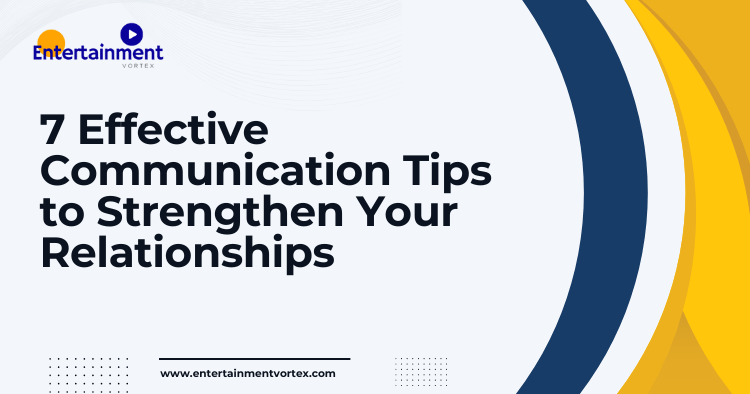Table of Contents
- Understand the Importance of Communication
- Practice Active Listening
- Be Honest and Open
- Use Non-Verbal Cues
- Empathize and Validate Feelings
- Ask Questions
- Set Aside Time for Conversations
1. Understand the Importance of Communication
Effective communication is the cornerstone of any healthy relationship. It fosters understanding, resolves conflicts, and enhances emotional connections. When you communicate well, you are more likely to express your needs and feelings, which can prevent misunderstandings and build trust.
“Communication works for those who work at it.” – John Powell
Why is Communication Key?
- Builds Trust: Transparent communication helps in establishing trust, which is essential for any relationship.
- Minimizes Conflict: Clear discussions can prevent situations from escalating into arguments.
- Enhances Understanding: Understanding each other’s perspectives leads to a deeper bond.
For more insights on the significance of communication, check out Psychology Today.
2. Practice Active Listening
Active listening is more than just hearing the words someone is saying; it involves fully engaging with the speaker. This means paying attention, showing that you are listening, and responding thoughtfully.
“Most people do not listen with the intent to understand; they listen with the intent to reply.” – Stephen R. Covey
Tips for Active Listening:
- Maintain Eye Contact: This shows that you are focused and genuinely interested.
- Nod and Use Affirmative Words: Simple gestures like nodding or saying “I see” can encourage the speaker.
- Avoid Interrupting: Let the speaker finish their thoughts before you respond.
Benefits of Active Listening
- Fosters mutual respect.
- Creates an open environment for sharing.
- Reduces the likelihood of misunderstandings.
For more techniques on active listening, refer to MindTools. Also, look for our article on Top 10 Stress Relief Hobbies to Boost Well-Being for tips on how hobbies like listening to music can improve your listening skills.
3. Be Honest and Open
Honesty is crucial in fostering a deeper connection with those you care about. When you are open about your thoughts and feelings, you invite others to do the same.
“Honesty is the first chapter in the book of wisdom.” – Thomas Jefferson
Why Honesty Matters:
- Builds Trust: Honesty creates a solid foundation for trust.
- Encourages Authenticity: When you are honest, it allows others to be their true selves.
- Improves Conflict Resolution: Being open about your feelings can help resolve disagreements more effectively.
How to Practice Honesty:
- Share your feelings openly.
- Communicate your needs clearly.
- Avoid sugarcoating difficult topics.
For further reading on the power of honesty in relationships, visit Harvard Business Review. Additionally, if you’re interested in crafting as a way to express yourself honestly, check out our guide on 10 Essential Tips for Beginners in Knitting and Crocheting for creative expression.
4. Use Non-Verbal Cues
Non-verbal communication plays a significant role in how messages are perceived. Your body language, facial expressions, and tone of voice can convey more than words alone.
“The most important thing in communication is hearing what isn’t said.” – Peter Drucker
Key Non-Verbal Cues:
| Cue Type | Description |
|---|---|
| Body Language | Posture and gestures can convey openness or defensiveness. |
| Facial Expressions | A smile can indicate warmth, while a frown can signal discontent. |
| Tone of Voice | The way you say something can change its meaning completely. |
Importance of Non-Verbal Communication:
- Enhances the message you are trying to convey.
- Can indicate feelings that words may not express.
- Helps in building rapport and trust.
To learn more about non-verbal communication, check out Verywell Mind. Also, consider engaging in hobbies like crafting, as discussed in our article on 10 Creative Ways to Turn Hobbies into Profitable Side Hustles, where non-verbal cues can enhance collaborative projects.
5. Empathize and Validate Feelings
Empathy involves understanding and sharing the feelings of another person. By validating someone’s emotions, you show that you care and that their feelings matter.
“Empathy is about finding echoes of another person in yourself.” – Mohsin Hamid
Ways to Show Empathy:
- Reflect Back What You Hear: Paraphrasing shows you understand.
- Acknowledge Their Feelings: Use phrases like “I can see why you feel that way.”
- Avoid Judgment: Create a safe space for them to express themselves.
Benefits of Empathy:
- Strengthens emotional bonds.
- Reduces feelings of isolation.
- Encourages open dialogue.
For more on empathy in communication, visit Greater Good Science Center. You might also explore our article on 7 Hobbies That Boost Mental Health and Spark Creativity for activities that enhance empathetic understanding through community engagement.
6. Ask Questions
Asking questions encourages deeper conversations and shows that you are interested in the other person’s thoughts and feelings. It also helps clarify any uncertainties.
“The single most important thing in communication is hearing what isn’t said.” – Peter Drucker
Effective Questioning Techniques:
- Open-Ended Questions: These encourage detailed responses, e.g., “What do you think about…?”
- Clarifying Questions: Ensure understanding, e.g., “Can you elaborate on that?”
- Follow-Up Questions: Show you’re engaged, e.g., “How did that make you feel?”
Why Questions Matter:
- They demonstrate genuine interest.
- They can lead to more meaningful discussions.
- They help in resolving misunderstandings.
For more tips on questioning techniques, see MindTools. If you’re looking for fun ways to engage with kids while communicating, check out our article on 10 Fun Hobbies to Enjoy Together with Your Kids.
7. Set Aside Time for Conversations
In our busy lives, it’s easy to overlook the importance of dedicating time for meaningful conversations. Setting aside specific times to talk can enhance the quality of your communication.
“The most important thing in communication is hearing what isn’t said.” – Peter Drucker
How to Create Time for Conversations:
- Schedule Regular Check-Ins: Make it a habit to catch up regularly.
- Limit Distractions: Put away devices and focus on each other.
- Create a Comfortable Environment: Choose a setting that encourages open conversation.
Benefits of Quality Time:
- Fosters deeper connections.
- Improves the overall health of the relationship.
- Provides a platform for discussing important issues.
For more ideas on fostering meaningful conversations, visit The Gottman Institute. You might also enjoy our article on 10 Essential Tips to Kickstart Your Scrapbooking Journey as a creative activity to promote deeper conversations through shared memories.
Conclusion
Building stronger relationships through effective communication takes time and effort, but the rewards are well worth it. By practicing active listening, being honest, using non-verbal cues, empathizing, asking questions, and setting aside time for meaningful conversations, you can significantly enhance your connections with others.
“The quality of your life is determined by the quality of your relationships.” – Tony Robbins
Feel free to share your thoughts or ask questions in the comments below!






